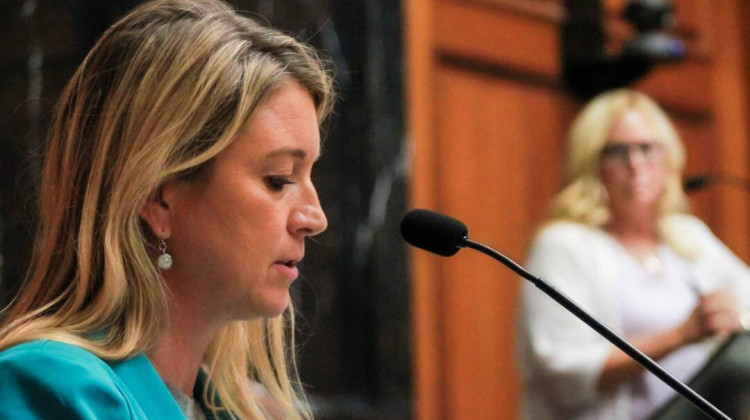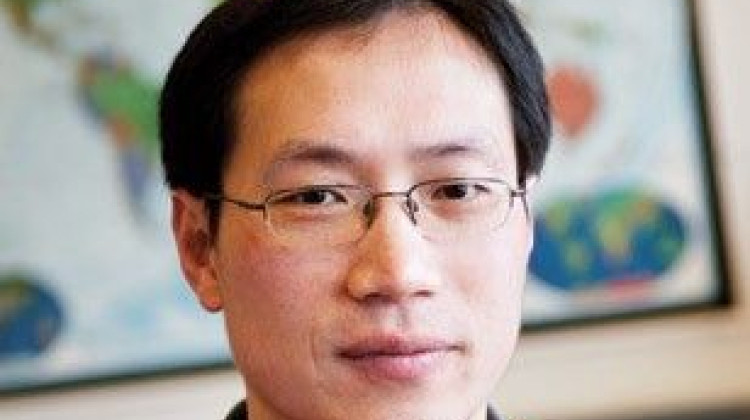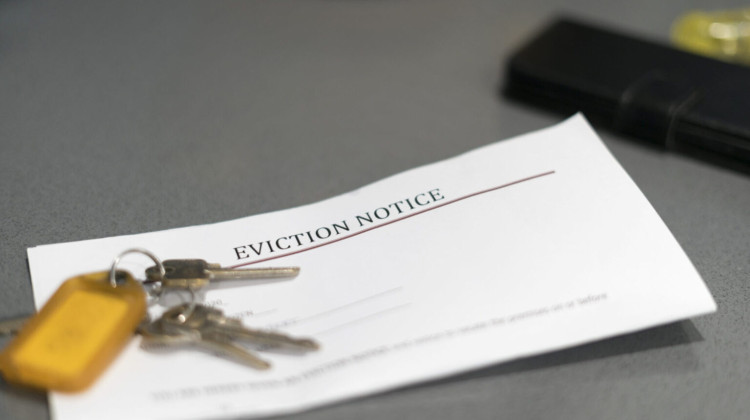
Hillary Clinton addresses supporters at Long Beach City College on the final day of California campaigning last week in Long Beach, Calif.
In the wake of the deadliest mass shooting in U.S. history, Hillary Clinton told NPR that in order to counter "self-radicalization," she wanted to create a team "exclusively dedicated to detecting and preventing lone wolf attacks" and possibly even expand terrorist watch lists.
She also called for creating more "integrated intelligence use" among local, state and national law enforcement; "strengthening communication" with other countries; and working with Silicon Valley to "prevent online radicalization."
Clinton suggested that getting more information to local law enforcement could have helped prevent this attack.
"We need to look carefully at this," she said. "Should we have a broader database? If someone comes to the attention of the FBI not once, but three times, that suggests that law enforcement needs to know, that people need to be more aware."
"If there had been a broader list that would have triggered the comprehensive background check required under Brady, that might have put a big red flag in the way of him purchasing the assault weapon plus the ammunition," she later added.
She also suggested a law that would prevent people on the no-fly list from purchasing guns. President Obama floated that idea in the wake of December's shooting in San Bernardino, Calif., but the proposal failed to pass.
The interview with NPR was one of a flurry of morning-show appearances on Monday for both Donald Trump and Clinton as they scrambled to frame the narrative around the attack. Those narratives from both candidates were familiar: Trump said the U.S. needs to be "tough," attacked Obama for what Trump characterized as weakness on terrorism, expressed worries about foreigners entering the U.S., and defended Second-Amendment rights. Clinton, meanwhile, dismissed Trump as dangerous and impulsive while trying to focus on her specific policy proposals, including the expanded watch lists.
The idea to use the no-fly list as part of gun-control measures is controversial both among some on the left and the right. Opponents include both the NRA and the American Civil Liberties Union, both of which have voiced concerns that the list contains some names that it shouldn't and therefore infringes on people's rights.
The American Civil Liberties Union's Hina Shamsi wrote in December that the list could feasibly be used as a gun control measure in the future, but only if the list is fixed.
"The standards for inclusion on the No-Fly List are unconstitutionally vague, and innocent people are blacklisted without a fair process to correct government error," she wrote, adding that the list is "error-prone," with "devastating" consequences for some.
Clinton on Monday also criticized Florida's gun laws for, among other things, not requiring a permit to purchase a gun.
For his part, Donald Trump made news on Monday when he sparked controversy with this comment about President Obama:
"He doesn't get it or he gets it better than anybody understands. It's one or the other," he told Fox & Friends on Monday morning.
Later in the interview, Trump likewise seemed to say that the president himself is dangerous — and hiding something.
"We're led by a man that is a very — look, we're led by a man that either is not tough, not smart, or he's got something else in mind," Trump said. "And the something else in mind, you know, people can't believe it. People, they cannot believe that President Obama is acting the ways he acts and can't even mention the words 'radical Islamic terrorism.' There's something going on. It's inconceivable. There's something going on."
Later, on NBC's Today show, anchor Savannah Guthrie pressed him on those comments, asking what he meant when he said Obama "gets it better than anybody understands."
"Well, there are a lot of people that think maybe he doesn't want to get it," Trump said. "A lot of people think maybe he doesn't want to know about it. I happen to think that he just doesn't know what he's doing."
In the NPR interview, Clinton took aim at Trump, saying she would be more qualified to protect Americans from ISIS and also wouldn't be such an inflammatory figure among America's enemies.
"I think it's only fair that Americans take into account who can keep them safe, who has the best ideas for defeating ISIS, and protecting us here at home," she told NPR's Steve Inskeep. She later added, "I think that I have been clear that demonizing and demagoguing about Muslims is not only offensive, it is dangerous and it plays into ISIS's hands."
As for Trump's proposals, he told Guthrie that the U.S. needs better "intelligence gathering" and to deal with the problem of "mental instability." He also said Americans need to be willing to call the authorities when they see friends, family and neighbors performing suspicious activities.
Additionally, in the wake of the attack, he had also repeated his earlier call for a ban on Muslims entering the U.S., though the Orlando shooter was U.S.-born.
When Guthrie asked Trump if he would support an assault weapons ban, he said he would not. (Trump wrote in his 2000 book the America We Deserve that he was in favor of such a ban.)
The event has also renewed the argument over using the phrase "radical Islamic terrorism." Trump called on Obama to resign because he declines to use the phrase. "Unless you know the words and unless you know what's going on you're never going to solve the problem," Trump said on Today.
Clinton had earlier in the cycle defended her refusal to use the term, telling ABC's This Week that the phrase "doesn't do justice to the vast number of Muslims in our country and around the world who are peaceful people."
On Today, Clinton did use the phrases "radical jihadist terrorism" and "radical Islamist terrorism," saying she thinks they "mean the same thing." She said she's happy to call it either, but she again said she's not going to "demagogue" an entire religion, saying it plays into ISIS' hands.
9(MDEwMDc1MzM3MDEzNDczOTA0MDc1MzViMQ001))
 DONATE
DONATE






 View More Articles
View More Articles


 Support WFYI. We can't do it without you.
Support WFYI. We can't do it without you.